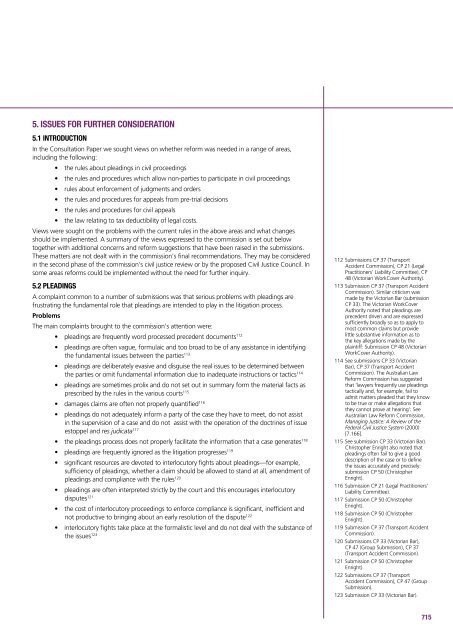12Facilitating Ongoing Civil Justice Review and Reform
12Facilitating Ongoing Civil Justice Review and Reform
12Facilitating Ongoing Civil Justice Review and Reform
Create successful ePaper yourself
Turn your PDF publications into a flip-book with our unique Google optimized e-Paper software.
5. ISSUES FOR FURTHER CONSIDERATION<br />
5.1 Introduction<br />
In the Consultation Paper we sought views on whether reform was needed in a range of areas,<br />
including the following:<br />
• the rules about pleadings in civil proceedings<br />
• the rules <strong>and</strong> procedures which allow non-parties to participate in civil proceedings<br />
• rules about enforcement of judgments <strong>and</strong> orders<br />
• the rules <strong>and</strong> procedures for appeals from pre-trial decisions<br />
• the rules <strong>and</strong> procedures for civil appeals<br />
• the law relating to tax deductibility of legal costs.<br />
Views were sought on the problems with the current rules in the above areas <strong>and</strong> what changes<br />
should be implemented. A summary of the views expressed to the commission is set out below<br />
together with additional concerns <strong>and</strong> reform suggestions that have been raised in the submissions.<br />
These matters are not dealt with in the commission’s final recommendations. They may be considered<br />
in the second phase of the commission’s civil justice review or by the proposed <strong>Civil</strong> <strong>Justice</strong> Council. In<br />
some areas reforms could be implemented without the need for further inquiry.<br />
5.2 Pleadings<br />
A complaint common to a number of submissions was that serious problems with pleadings are<br />
frustrating the fundamental role that pleadings are intended to play in the litigation process.<br />
Problems<br />
The main complaints brought to the commission’s attention were:<br />
112<br />
• pleadings are frequently word processed precedent documents<br />
• pleadings are often vague, formulaic <strong>and</strong> too broad to be of any assistance in identifying<br />
the fundamental issues between the parties 113<br />
• pleadings are deliberately evasive <strong>and</strong> disguise the real issues to be determined between<br />
the parties or omit fundamental information due to inadequate instructions or tactics 114<br />
• pleadings are sometimes prolix <strong>and</strong> do not set out in summary form the material facts as<br />
prescribed by the rules in the various courts 115<br />
116<br />
• damages claims are often not properly quantified<br />
• pleadings do not adequately inform a party of the case they have to meet, do not assist<br />
in the supervision of a case <strong>and</strong> do not assist with the operation of the doctrines of issue<br />
estoppel <strong>and</strong> res judicata 117<br />
118<br />
• the pleadings process does not properly facilitate the information that a case generates<br />
119<br />
• pleadings are frequently ignored as the litigation progresses<br />
• significant resources are devoted to interlocutory fights about pleadings—for example,<br />
sufficiency of pleadings, whether a claim should be allowed to st<strong>and</strong> at all, amendment of<br />
pleadings <strong>and</strong> compliance with the rules 120<br />
• pleadings are often interpreted strictly by the court <strong>and</strong> this encourages interlocutory<br />
disputes 121<br />
• the cost of interlocutory proceedings to enforce compliance is significant, inefficient <strong>and</strong><br />
not productive to bringing about an early resolution of the dispute 122<br />
• interlocutory fights take place at the formalistic level <strong>and</strong> do not deal with the substance of<br />
the issues 123<br />
112 Submissions CP 37 (Transport<br />
Accident Commission), CP 21 (Legal<br />
Practitioners’ Liability Committee), CP<br />
48 (Victorian WorkCover Authority).<br />
113 Submission CP 37 (Transport Accident<br />
Commission). Similar criticism was<br />
made by the Victorian Bar (submission<br />
CP 33). The Victorian WorkCover<br />
Authority noted that pleadings are<br />
precedent driven <strong>and</strong> are expressed<br />
sufficiently broadly so as to apply to<br />
most common claims but provide<br />
little substantive information as to<br />
the key allegations made by the<br />
plaintiff: Submission CP 48 (Victorian<br />
WorkCover Authority).<br />
114 See submissions CP 33 (Victorian<br />
Bar), CP 37 (Transport Accident<br />
Commission). The Australian Law<br />
<strong>Reform</strong> Commission has suggested<br />
that ‘lawyers frequently use pleadings<br />
tactically <strong>and</strong>, for example, fail to<br />
admit matters pleaded that they know<br />
to be true or make allegations that<br />
they cannot prove at hearing’: See<br />
Australian Law <strong>Reform</strong> Commission,<br />
Managing <strong>Justice</strong>: A <strong>Review</strong> of the<br />
Federal <strong>Civil</strong> <strong>Justice</strong> System (2000)<br />
[7.166].<br />
115 See submission CP 33 (Victorian Bar).<br />
Christopher Enright also noted that<br />
pleadings often fail to give a good<br />
description of the case or to define<br />
the issues accurately <strong>and</strong> precisely:<br />
submission CP 50 (Christopher<br />
Enright).<br />
116 Submission CP 21 (Legal Practitioners’<br />
Liability Committee).<br />
117 Submission CP 50 (Christopher<br />
Enright).<br />
118 Submission CP 50 (Christopher<br />
Enright).<br />
119 Submission CP 37 (Transport Accident<br />
Commission).<br />
120 Submissions CP 33 (Victorian Bar),<br />
CP 47 (Group Submission), CP 37<br />
(Transport Accident Commission).<br />
121 Submission CP 50 (Christopher<br />
Enright).<br />
122 Submissions CP 37 (Transport<br />
Accident Commission), CP 47 (Group<br />
Submission).<br />
123 Submission CP 33 (Victorian Bar).<br />
715
















